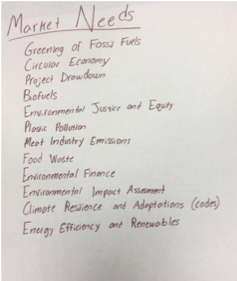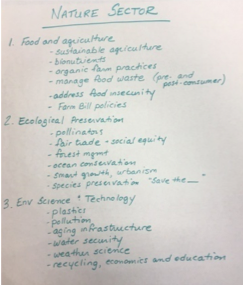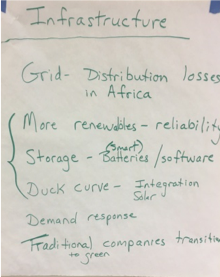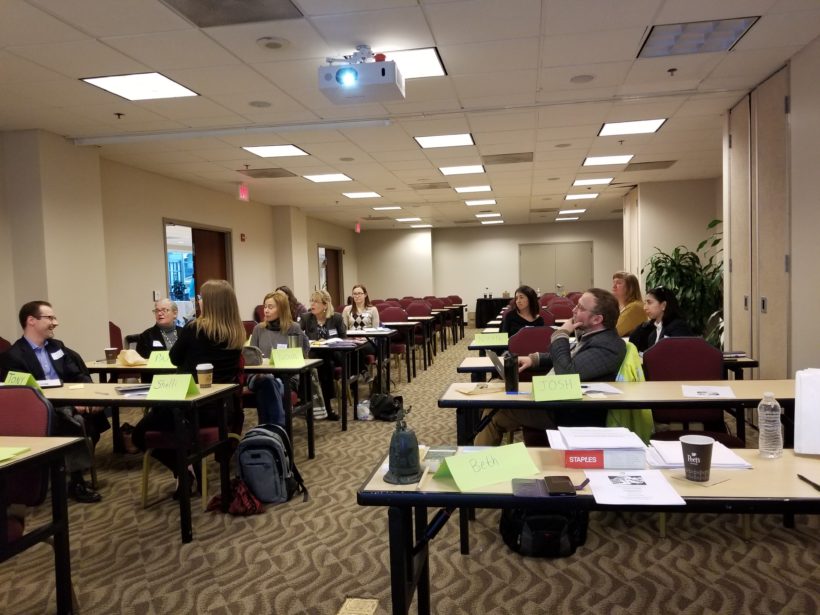
By Khadija Khan
On March 22, 2019, Leaders in Energy and National Association of Homebuilders (NAHB) jointly hosted two Green Career Workshops at NAHB in Washington, DC. The workshops were aimed at those who are seeking to advance their current Green Career or pursue one, or become a green entrepreneur.
The two workshops provided key insights on career strengths and preferences and how to tailor them to the growing green economy, e.g., clean energy, sustainability, circular economy, resiliency, and more. Attendees also shared and discussed the current market dynamics of the “green” economy.
Workshop 1.0 opened with an inspiring speech from Michelle Diller, PE, PMP, CGP, Program Manager, Sustainability & Green Building at NAHB. Diller provided insightful tips for those seeking a green career, and highlighted the NAHB’s efforts in embracing green advances in homebuilding.
The Green Career Workshop 1.0, ‘What’s Your Green Career Plan?,’ was conducted by Beth Offenbacker, Ph.D., anexpert in developing and implementing talent management programs for emerging and established professionals. In addition to job seekers and students, the workshop was attended by professionals from diverse backgrounds and organizations including National Geographic, WGL Holdings, Grid Alternatives and ASAP.
Participants began by introducing themselves and the morning included a variety of interactive exercises designed to focus on individual strengths, skillsets, and career options and that built on pre-workshop self-assessments that were provided to attendees. The workshop also included a discussion of strategies for remaining proactive in the job search.
A core goal of the workshop is to help attendees identify where they want to focus their career plan. During this part of the morning, participants chose one sector from four Green Economy sectors in order to identify what interests them most. The sectors were:
1-Creating Demand– which includes Research, Design, and Consulting Service; Governmental and Regulatory Administration; and Environmental Protection.
2- Infrastructure (IT/Build Environment)– which includes Energy & Smart Grid, Information Technology, Buildings, Transportation.
3- Manufacturing Cycle– which includes Extraction Raw Materials, Processing Materials, Supply Chain, Manufacturing, Distribution, Waste and
4- Nature– this includes but is not limited to Environmental Science, Natural Resource Management.
The participants were divided into groups based on their desired sectors and were asked to discuss the possible trends and career possibilities available within these sectors. Finally, each group developed a list of potential strategic career options within their chosen field as follows:



NOTE: In this workshop, the small groups focused on
Green Economy sectors 1, 2, and 4.
Later in the session, participants were asked to interview one another on career goals, top three strengths and one thing that he/she is very good at doing. Then the answer sheets were swapped with their partners. The exercise provided a chance to practice interviewing skills, and gave a chance to understand each other’s strengths. Some of the unique strengths included bringing people together, joining teams to make an impact, helping organizations in getting funding, offering education and training, collaborating with organizations to work for a cause, integrity andethics, time management, quality output among others.
Finally, the participants were given a Career/Future plan to define their goals, preferences, education and skills and an action plan to achieve their career goal.
The main outcomes of the workshop were as follows:
- The participants completed activities to guide them in identifying their core career assets including strengths, skills, abilities, and knowledge that they can offer to potential employers and/or use to create their own opportunities
- Developed a career plan appropriate to their career level
- Networked with fellow Leaders in Energy members who can be a career resource for them
- Engaged in group discussions about the context around the careers available in the Green Economy
- Provided useful resources to find their dream job/profession
To sum up, the workshop provided valuable resources and tools for developing a Green Career Plan. It also offered participants a chance to interact with each other and created tremendous connections with empathy among the participants.
Khadija has recently completed her Executive Masters in Natural Resource (XMNR) and a Graduate Certificate in Global Sustainability from Virginia Tech’s Centre for Leadership and Global Sustainability, NCR Campus. She has vast experience in applying Geospatial technology to sustainable infrastructure and international development projects and is working towards challenges and responses to Urban Sustainability issues.



Leave a Reply